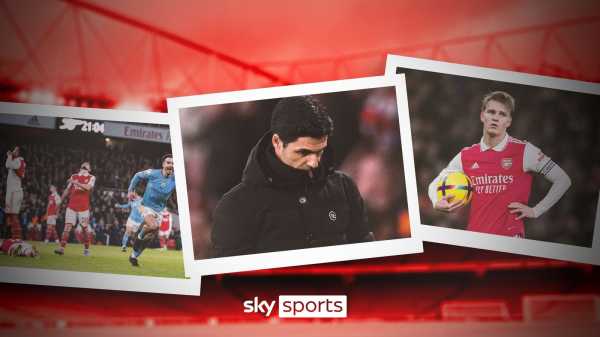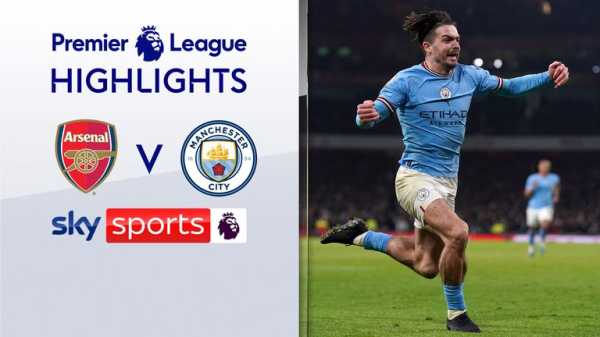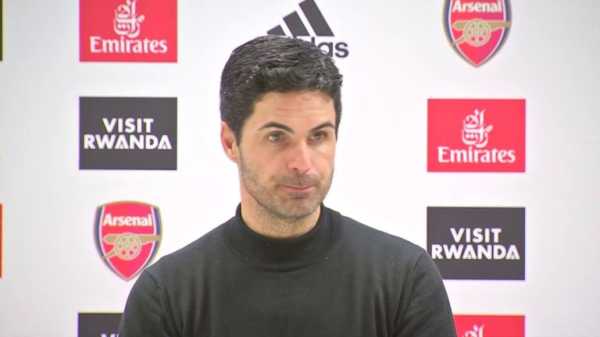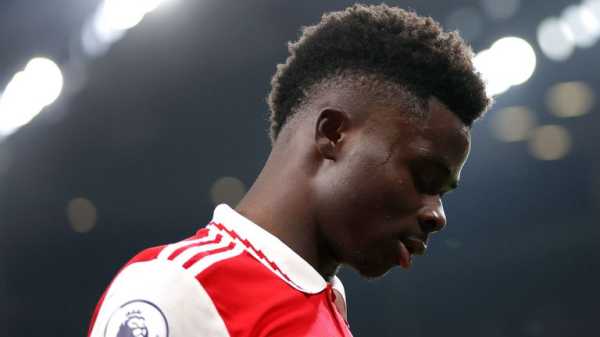
“The most important thing is how we are tomorrow,” said Mikel Arteta. The Arsenal manager has repeated the mantra throughout the season but it felt more relevant than ever in the wake of Wednesday’s 3-1 loss to Manchester City.
After the bitter disappointment of relinquishing top spot, the defeat allowing Pep Guardiola’s defending champions to wrestle back the initiative in the title race, the focus immediately shifts to what happens next. Aston Villa await and it’s a quick turnaround.
Arteta spoke of the “marathon” that still lies ahead in his press conference on Wednesday night. “Psychologically, there is very far to go,” he said. Privately, though, he will accept the potentially huge significance of how Arsenal respond at Villa Park.
A win would re-establish a three-point lead at the top of the table, putting the pressure back on City before their clash with Nottingham Forest. Anything less would extend Arsenal’s winless run to four Premier League games, causing alarm bells to ring louder.
- Haaland: We played like champions | Arteta: We gave it away
- FA to investigate Arsenal after objects thrown at De Bruyne

FREE TO WATCH: Highlights from Manchester City’s win against Arsenal
Taken in isolation, the three setbacks preceding their trip to Villa Park on Saturday are easily explained.
Trending
- Papers: Qatari investors confident of sealing Man Utd purchase
- Qataris will bid for Man Utd amid USA, Saudi interest | Deadline 10pm Friday
- Ten Hag fumes as Kounde escapes red | Rashford: Why would I go down?
- Transfer Centre latest: Retired Redknapp ‘wants Leeds job’
- PL Predictions: ‘1-0 to the Arsenal’ – Gunners to end winless run
- Man Utd takeover Q&A: How many bidders? What is the bidding process?
- Alpine reveal two liveries for F1 2023’s final car | ‘We’ve got to close gap’
- Europa round-up: Mourinho’s Roma lose to Salzburg, Juve held by Nantes
- Smith shows class against Van den Bergh and Price to win in Glasgow
- How do wounded Arsenal respond?
- Video
- Latest News
In Everton, Arsenal faced a side buoyed by a change of manager, at a ground where they had lost three of their previous four visits and not emerged with three points since 2017.
In Brentford, and without even considering VAR’s role in the 1-1 draw, they met a side on a nine-game unbeaten run who have this season taken points off all five other members of the big six.
Also See:
Then, there was Manchester City, a side who, at their clinical, suffocating best – as they were in the second half of Wednesday’s encounter at the Emirates Stadium – can punish any opponent.
Together, though, the results comprise a significant blip. It is impossible to pretend otherwise. Arsenal have dropped more points in three Premier League games than they did in the previous 19.
Those three games have featured clear themes, the most significant, and, perhaps, the most worrying, given the turnaround to Saturday’s early kick-off is only around 60 hours, being fatigue.
Datawrapper Due to your consent preferences, you’re not able to view this. Open Privacy Options
It is hardly surprising they are tiring given the sheer volume of minutes Arteta’s regular starters have played this season. Arsenal’s total of 16 line-up changes is the lowest in the division. Manchester City, by contrast, have made 54, the fourth-most.
There is a difference in freshness as a result and Premier League tracking data underlines the issue.
In each of the last three games, Arsenal’s opponents have outrun them by an average of more than 3km, something which only happened once in the first five games after the World Cup break, and only five times in the 14 games before that.
The difference in intensity was particularly stark in the second half against City, when Arsenal laboured badly, seemingly drained from their first-half efforts, as City pushed them back and kept them there, the hosts unable to haul themselves up off the canvas.
Datawrapper Due to your consent preferences, you’re not able to view this. Open Privacy Options
The fatigue has taken a mental toll as well as a physical one.
At one end, a lack of sharpness, both in terms of creating chances and finishing them. At the other, a collective wavering of concentration levels which is resulting in uncharacteristic defensive errors such as the ones that proved so costly against City.
The conundrum for Arteta is how exactly he changes things.
Leandro Trossard looks an obvious alternative to Gabriel Martinelli on the left flank following some promising cameos since his January arrival from Brighton. Jorginho has shown he can deputise for the injured Thomas Partey, albeit without replacing his qualities.
But beyond that his options are limited.
Ben White can come back in for Takehiro Tomiyasu at right-back, but Fabio Vieira is still seemingly seen only as an option from the bench and likewise Reiss Nelson, who has just returned to fitness.
Kieran Tierney does not offer the same ability to tuck into midfield as Oleksandr Zinchenko, while Jakub Kiwior, the £20m centre-back signed from Spezia, is still finding his feet in new surroundings.

Arsenal boss Mikel Arteta rued Arsenal’s defensive errors against Man City
How Arteta would love to be able to call on Gabriel Jesus.
The Brazilian’s finishing was patchy in the first half of the season but his wider impact on Arsenal’s attack was seismic, his movement, dropping deep and pulling wide, causing chaos in opposition defences and creating space for team-mates to exploit.
Eddie Nketiah deserves credit for the manner in which he has deputised but, having previously scored seven goals in seven games in all competitions, he has now failed to find the net in four.
His missed chances against City betrayed a dip in confidence and, more significantly, Arsenal’s collective threat has gone the same way. The underlying data shows they generated an average of only 1.10 expected goals per game against Everton, Brentford and City, excluding penalties, that number down from 1.97 per game earlier this season.
Emile Smith Rowe’s continued absence due to injury is another issue in an offensive sense given his creative qualities, and given he was Arsenal’s second-highest scorer last season with 10 Premier League goals. He is also capable of playing anywhere across the front line.
But more troubling still is that Arsenal’s recent blip has exposed defensive vulnerabilities too.
Datawrapper Due to your consent preferences, you’re not able to view this. Open Privacy Options
In addition to their decreased productivity in attack, there has been a dramatic increase in the number and quality of chances they are giving up to their opponents at the other end of the pitch.
Gabriel Magalhaes and William Saliba formed a formidable centre-back pairing earlier this season, but opponents will have noted how a direct approach has unsettled them in recent games.
Dominic Calvert-Lewin and Ivan Toney physically dominated them for Everton and Brentford, and the same was true of Erling Haaland on Wednesday night. Indeed, while Tomiyasu took the blame for City’s opener, it is worth noting the chance arose from the Norwegian beating Saliba in an aerial duel from Ederson’s long kick.
Those details are unlikely to be lost on the meticulous Unai Emery, whose opposition analysis is the stuff of legend, so don’t be surprised if he hands a first start to the towering striker Jhon Duran, signed from Chigaco Fire in January and impressive off the bench in Aston Villa’s 3-1 loss at the Etihad Stadium on Sunday.

Image: Bukayo Saka pictured during the 3-1 defeat to Manchester City
The Colombian would offer another stern test for Saliba and Gabriel but Arsenal’s three-game blip, although a measure of just how good they have been this season, ensures the trip to Villa Park has the look of a daunting challenge regardless of opposition personnel.
Arteta must hope Arsenal are ready.
The next leg of the marathon looms.
Follow Aston Villa vs Arsenal live on Sky Sports’ digitial platforms from 11am on Saturday; kick-off 12.30pm; free match highlights available from 5.15pm
Sourse: skysports.com






